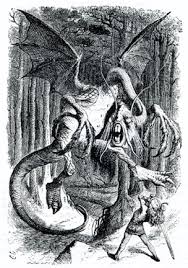Lewis Carroll’s Poetic Puzzles
Listen to the Recess! Clip
| Author | Kevin Shortsleeve |
| Air Date | 1/27/2005 |

Lewis Carroll’s Poetic Puzzles Transcript
Perhaps no four lines are more famous in the realm of children’s poetry than the opening stanza to “Jabberwocky”, – Lewis Carroll’s penultimate moment as a children’s poet – As read by William Rushton from the first chapter of Through the Looking Glass
‘Twas brillig, and the slithy toves,
Did gyre and gimble in the wabe:
All mimsy were the borogoves,
And the mome raths outgrabe.
According to Carroll, many of the nonsense words in this poem are Anglo-Saxon – and he provided a translation of them for the curious. But, in reading Carroll’s notation, one gets the feeling one is being had. After quote – unquote “Translating” the vocabulary, he gives the meaning as: “It was evening, and the smooth active badgers were scratching and boring holes in the hill-side; all unhappy were the parrots; and the grave turtles squeaked out.”
But that’s the way it goes with Lewis Carroll – he was a math professor after all – and many of his poems take as much to work out – as an algebraic equation. With the inclusions of puzzles and riddles in many of his poems, a mature child can test his wit.
John gave his brother James a box:
About it there were many locks.
James woke and said it gave him pain;
So gave it back to John again.
The box was not with lid supplied,
Yet caused two lids to open wide:
And all these locks had never a key-
What kind of box, then, could it be? The answer, of course, is that the sort of box that was being exchanged by the brothers was a punch. They were hitting each other. Another playful type of poem often attempted by Carroll were acrostic poems – where the name of someone – or a hidden message – was tucked neatly away in the poem in some ordered fashion. At the end of Through the Looking Glass is a poem where the first letter in each line spells the name Alice Pleasance Liddell, the name of the real Alice, for whom Carroll originally composed the two Alice books.
Other acrostic poems by Carroll have much more complicated patterns which – again – the mature child may enjoy discovering. Like the character in the poem “Jabborwocky”, a child can face the specter of a challenge, solve the problem – and shout:
“Oh frabjous day! Callooh! Callay!” And chortle in his joy.”